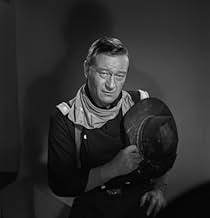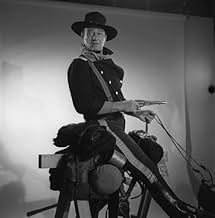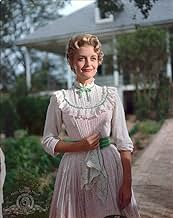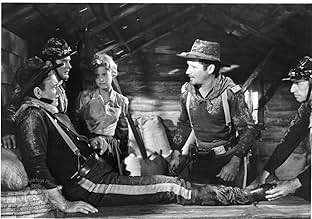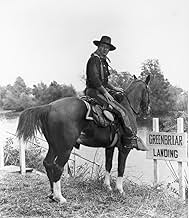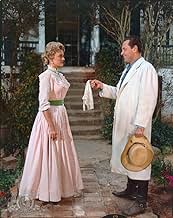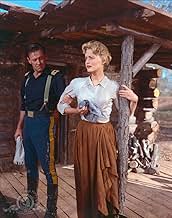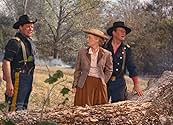IMDb रेटिंग
7.1/10
12 हज़ार
आपकी रेटिंग
अपनी भाषा में प्लॉट जोड़ेंIn 1863, a Union outfit is sent behind Confederate lines in Mississippi to destroy enemy railroads but a captive southern belle and the unit's doctor cause frictions within ranks.In 1863, a Union outfit is sent behind Confederate lines in Mississippi to destroy enemy railroads but a captive southern belle and the unit's doctor cause frictions within ranks.In 1863, a Union outfit is sent behind Confederate lines in Mississippi to destroy enemy railroads but a captive southern belle and the unit's doctor cause frictions within ranks.
- निर्देशक
- लेखक
- स्टार
- पुरस्कार
- कुल 1 नामांकन
फ़ीचर्ड समीक्षाएं
This film has the usual Hollywood-style errors about the Civil War -- men talking about Andersonville Prison months before it was established, minor diversions treated as the pivotal event of a campaign, that sort of thing. The biggest error though was the replacement of the fascinating Colonel Ben Grierson with Wayne's railroad man character. Grierson was a music teacher who was afraid of horses because one kicked him in the head as a child. Joining the Union army to fight slavery (he was a staunch abolitionist) he wanted infantry duty but was assigned to the cavalry by mistake. He turned out to be good at it and stayed in the cavalry after the war, becoming the first Colonel of the 10th Cavalry (Buffalo soldiers). It'd have been nice to see Grierson on screen.
Historical inaccuracy aside though the movie did quite well. The film showed multiple viewpoints and a fair degree of respect for most of them. It showed aspects of the war that were generally ignored in other films of the period -- the bloody horror of battlefield amputations, the desire of people to give up on the whole thing (I can't think of an earlier film that talked about deserters and the way they disrupted the southern home front), and the pain of the sheer physical destruction of the war -- a pain that affected the destroyers as well as the victims, something Gone With the Wind never quite admitted.
Some posters have complained about southern belle Hannah Hunter's overuse of sex appeal to spy on Union soldiers -- while there was no historical Hannah Hunter there were plenty of southern women who did just that, including Belle Boyd, Rose Greenhow and others. Some posters have complained about the way the film trivializes slavery -- this is unfair. It underplays slavery but never trivializes it. It shows conflicts within the Union army about the institution and addresses the issue of personal loyalty between some slaves and masters without glamorizing the institution as a whole. Does the film go far enough by modern standards? No. But it goes much farther than its contemporary and treats the slavery issue more honestly than modern travesties like Gods And Generals.
One poster actually complained about how inaccurate southern snipers were -- this is completely unfair. There was no indication that the "snipers" were specially trained men with Whitworth rifles or anything like that. They looked more like ordinary troopers out skirmishing, or perhaps the even more poorly trained militia. Ordinary soldiers fired more than 100 rounds for every hit they scored, so poor shooting on either side is nothing to be surprised about.
8 out of 10
Historical inaccuracy aside though the movie did quite well. The film showed multiple viewpoints and a fair degree of respect for most of them. It showed aspects of the war that were generally ignored in other films of the period -- the bloody horror of battlefield amputations, the desire of people to give up on the whole thing (I can't think of an earlier film that talked about deserters and the way they disrupted the southern home front), and the pain of the sheer physical destruction of the war -- a pain that affected the destroyers as well as the victims, something Gone With the Wind never quite admitted.
Some posters have complained about southern belle Hannah Hunter's overuse of sex appeal to spy on Union soldiers -- while there was no historical Hannah Hunter there were plenty of southern women who did just that, including Belle Boyd, Rose Greenhow and others. Some posters have complained about the way the film trivializes slavery -- this is unfair. It underplays slavery but never trivializes it. It shows conflicts within the Union army about the institution and addresses the issue of personal loyalty between some slaves and masters without glamorizing the institution as a whole. Does the film go far enough by modern standards? No. But it goes much farther than its contemporary and treats the slavery issue more honestly than modern travesties like Gods And Generals.
One poster actually complained about how inaccurate southern snipers were -- this is completely unfair. There was no indication that the "snipers" were specially trained men with Whitworth rifles or anything like that. They looked more like ordinary troopers out skirmishing, or perhaps the even more poorly trained militia. Ordinary soldiers fired more than 100 rounds for every hit they scored, so poor shooting on either side is nothing to be surprised about.
8 out of 10
The "...and I didn't kill either one of them..." speech is one of my favorite Wayne moments. Plainly past his conventionality, the Marlowe character gives breathtaking short shrift to the unending pettiness and fallibility he encounters; Kirby, Kendall, congressional wannabes, reb deserters et.al. It's an exemplar of the 'Duke' personna: dubious provenance, grand stature, indomitable purpose and a trace of sentiment. I'l put it with Searchers, Liberty', and Shootist (Wallace Beery impersonation in True Grit aside) as one of his best efforts.
Ford's battle scenes are as usual patriotically free of blood and require no reflection but the imagery is great (you want to join the cavalry) and the detail outstanding. We hear the clanking of canteens and cookpots, an argument over the placement of latrines and see the only filmic presentation of the making of Sherman Neckties (warped rails). The Ford family is well represented though we miss Harry Carey Jr (and Paul Fixx must have been tied up with the Rifleman).
If we had to have a love interest, Maureen Ohara could have at least tied this to "Rio Grande" and furthered the Ford library.
Normally wonderful Bill Holden has only brief bright moments and is mostly going through the motions and hung-over here. Neither Wayne nor Ford were slouches when it came to curling whiskey but by his own admission Holden aggravated all and threatened production with reckless, drunken extracurriculae, breaking an arm falling from a bridge.
This film was an inspiration in grade school and a guilty pleasure since.
Ford's battle scenes are as usual patriotically free of blood and require no reflection but the imagery is great (you want to join the cavalry) and the detail outstanding. We hear the clanking of canteens and cookpots, an argument over the placement of latrines and see the only filmic presentation of the making of Sherman Neckties (warped rails). The Ford family is well represented though we miss Harry Carey Jr (and Paul Fixx must have been tied up with the Rifleman).
If we had to have a love interest, Maureen Ohara could have at least tied this to "Rio Grande" and furthered the Ford library.
Normally wonderful Bill Holden has only brief bright moments and is mostly going through the motions and hung-over here. Neither Wayne nor Ford were slouches when it came to curling whiskey but by his own admission Holden aggravated all and threatened production with reckless, drunken extracurriculae, breaking an arm falling from a bridge.
This film was an inspiration in grade school and a guilty pleasure since.
Director John Ford was notably sentimental about the actors and crew who had worked with him over the years in his film 'family.' Among these was an old stunt man and western wrangler, Fred Kennedy. Against his better judgment, Ford gave Kennedy a stunt ride in "The Horse Soldiers." Kennedy's horse fell, breaking the old actor's neck. The scene was retained in the final cut. But Ford was broken-hearted with guilt.
A Civil War film where the history of the Civil War is all just jumbled together into a pastiche of life in the South while an unconvincing love affair bubbles up between a Union officer and Confederate woman, an oddly built feud between two Union officers breaks out, and the movie just kind of stops because an on set accident let to a death that sapped the director's enthusiasm for the project and he never filmed the ending, The Horse Soldiers is John Ford phoning the effort in. Talked into embracing sobriety by his doctor for his health, Ford seems to have been off his game here, never quite finding the right footing for the cavalry story.
It's the Western Theater of the war and General Grant is setting up his siege of Vicksburg. In order to help ensure his position, he orders Colonel John Marlowe (John Wayne) to head south towards Newton Station, Mississippi, the Confederacy's main train station for supplies to Vicksburg, to destroy any contraband as well as the railroad itself. The mission requires secrecy and guts, heading hundreds of miles into enemy territory, and Marlowe is the man to do it. Before he sets out, he's assigned a new officer, Major Henry Kendall (William Holden), a surgeon who refuses to carry a gun. There's antipathy between the two men from the moment Kendall shows up in camp, but Marlowe follows his orders and takes him along.
In Mississippi, the column soon comes across an isolated country home, Greenbriar, where Hanna Hunter (Constance Towers) and her servant slave Lukey (Althea Gibson) are waiting out the war. After some feigned hospitality, Kendall notes that Hunter is spying on Marlowe's officer meeting, hearing their plan to head straight through past Newton Station once it's sacked to Baton Rouge. Feeling like there's no choice, Marlowe decides to take Hanna and Lukey along so they won't give up the column's position, mission, or destination. So begins the ineffective romance between Marlow and Hanna that starts as a meet cute and never really moves past. She becomes slightly enamored of him because of his...well, it's not entirely clear why. He's a hard man, a dedicated Northerner, a man bred from a lower class (he's a train engineer without a formal education), but he does have a certain sense of honor that she finds attractive, I suppose, most notably when the column comes across a pair of Confederate deserters who have taken the local sheriff hostage. Marlowe gets some information from the deserters before knocking them out and handing them off to the sheriff with a tip of the hat.
There are two great moments in this film, and the first comes in Newton Station. They arrive in the little town with the people, mostly women, screaming at them to go home, and Marlowe figures out that the local Confederate colonel has set up a trap with an approaching train engine that's filled with Confederate troops. The battle that erupts is a slaughter and so poorly thought out from a military point of view that it's a wonder anyone thought it would be a good idea to include in the film (this isn't the great part, it's coming). Then the troops get to work on destroying the railroad, and it's just great to see the mechanics of what it means to tear up a railroad up to and including the creation of Sherman's neckties by wrapping the weakened iron railings around telegraph poles.
And then Wayne gives an impassioned speech about how much he hates doctors, and it's one of the oddest moments of the film. It feels like an idea made up on set rather than planned out. Marlowe hates doctors because some years ago two doctors convinced his wife that she had a tumor. They operated on her, they found nothing, and she died. To have this speech come up more than halfway through the film feels off, especially when this was the war where doctors were hacking off limbs with unclean equipment all the time. A speech about how doctors had lost him many good men during the fighting would have fit so much better. It would have applied to the situation at hand much more intimately, and operated as a direct challenge to Kendall who was in the same job. The use of a long-dead wife just feels random and off.
Anyway, the column moves on, and we get our second great moment of the film. Desperate for men (the scene ends up feeling like it should have taken place in late 1864 instead of early 1863, but whatever) a Confederate soldier shows up at the Jefferson Military School and begs for the headmaster to lead his students into battle against the Union cavalry that terrorized Newton Station. The old man, a reverend, organizing his boys of between 9 and 16 years old, into columns and leading them off to fight the dying cause (again...this fits better with a later in the war story, along with all the references to Andersonville that didn't open until 1864) while a widow begs him to let her have her only son left stay home is remarkably powerful. This could operate as a short film on its own, and it's great.
And then the students find the column, open fire, and Marlow refuses to fire on children while the movie ends up kind of treating the whole thing like a kind of joke.
The finale of the film is around a random bridge somewhere in Mississippi where Marlowe needs to fight off an approaching Confederate skirmishing force while another Confederate force comes upon them from another direction. It's not much of an action scene, doesn't seem to have much in terms of stakes, and doesn't really satisfy all that well. The actual ending of the film was apparently never shot because of the death of the stuntman during the filming of some action, and the movie simply stops with the Confederate column coming upon Kendall, who stayed behind to take care of the wounded.
This movie is kind of a mess, but there is some entertainment to be had. I find John Wayne watchable in just about anything he does, and since he's front and center for most of the film, he's an asset. Most of the looks at Confederate life carry a tinge of melancholy at their losing side that I appreciate. That bit with the boys leaving the military school is honestly outright beautiful in the anguish from the widowed mother. However, the story as a whole feels a bit random, the two major action sequences are lackluster, the romance simply doesn't work, and the professional rivalry between the two main male characters ends up feeling like something from a satire rather than a straight war picture.
I don't hate it, but this isn't exactly one of Ford's or Wayne's best efforts.
It's the Western Theater of the war and General Grant is setting up his siege of Vicksburg. In order to help ensure his position, he orders Colonel John Marlowe (John Wayne) to head south towards Newton Station, Mississippi, the Confederacy's main train station for supplies to Vicksburg, to destroy any contraband as well as the railroad itself. The mission requires secrecy and guts, heading hundreds of miles into enemy territory, and Marlowe is the man to do it. Before he sets out, he's assigned a new officer, Major Henry Kendall (William Holden), a surgeon who refuses to carry a gun. There's antipathy between the two men from the moment Kendall shows up in camp, but Marlowe follows his orders and takes him along.
In Mississippi, the column soon comes across an isolated country home, Greenbriar, where Hanna Hunter (Constance Towers) and her servant slave Lukey (Althea Gibson) are waiting out the war. After some feigned hospitality, Kendall notes that Hunter is spying on Marlowe's officer meeting, hearing their plan to head straight through past Newton Station once it's sacked to Baton Rouge. Feeling like there's no choice, Marlowe decides to take Hanna and Lukey along so they won't give up the column's position, mission, or destination. So begins the ineffective romance between Marlow and Hanna that starts as a meet cute and never really moves past. She becomes slightly enamored of him because of his...well, it's not entirely clear why. He's a hard man, a dedicated Northerner, a man bred from a lower class (he's a train engineer without a formal education), but he does have a certain sense of honor that she finds attractive, I suppose, most notably when the column comes across a pair of Confederate deserters who have taken the local sheriff hostage. Marlowe gets some information from the deserters before knocking them out and handing them off to the sheriff with a tip of the hat.
There are two great moments in this film, and the first comes in Newton Station. They arrive in the little town with the people, mostly women, screaming at them to go home, and Marlowe figures out that the local Confederate colonel has set up a trap with an approaching train engine that's filled with Confederate troops. The battle that erupts is a slaughter and so poorly thought out from a military point of view that it's a wonder anyone thought it would be a good idea to include in the film (this isn't the great part, it's coming). Then the troops get to work on destroying the railroad, and it's just great to see the mechanics of what it means to tear up a railroad up to and including the creation of Sherman's neckties by wrapping the weakened iron railings around telegraph poles.
And then Wayne gives an impassioned speech about how much he hates doctors, and it's one of the oddest moments of the film. It feels like an idea made up on set rather than planned out. Marlowe hates doctors because some years ago two doctors convinced his wife that she had a tumor. They operated on her, they found nothing, and she died. To have this speech come up more than halfway through the film feels off, especially when this was the war where doctors were hacking off limbs with unclean equipment all the time. A speech about how doctors had lost him many good men during the fighting would have fit so much better. It would have applied to the situation at hand much more intimately, and operated as a direct challenge to Kendall who was in the same job. The use of a long-dead wife just feels random and off.
Anyway, the column moves on, and we get our second great moment of the film. Desperate for men (the scene ends up feeling like it should have taken place in late 1864 instead of early 1863, but whatever) a Confederate soldier shows up at the Jefferson Military School and begs for the headmaster to lead his students into battle against the Union cavalry that terrorized Newton Station. The old man, a reverend, organizing his boys of between 9 and 16 years old, into columns and leading them off to fight the dying cause (again...this fits better with a later in the war story, along with all the references to Andersonville that didn't open until 1864) while a widow begs him to let her have her only son left stay home is remarkably powerful. This could operate as a short film on its own, and it's great.
And then the students find the column, open fire, and Marlow refuses to fire on children while the movie ends up kind of treating the whole thing like a kind of joke.
The finale of the film is around a random bridge somewhere in Mississippi where Marlowe needs to fight off an approaching Confederate skirmishing force while another Confederate force comes upon them from another direction. It's not much of an action scene, doesn't seem to have much in terms of stakes, and doesn't really satisfy all that well. The actual ending of the film was apparently never shot because of the death of the stuntman during the filming of some action, and the movie simply stops with the Confederate column coming upon Kendall, who stayed behind to take care of the wounded.
This movie is kind of a mess, but there is some entertainment to be had. I find John Wayne watchable in just about anything he does, and since he's front and center for most of the film, he's an asset. Most of the looks at Confederate life carry a tinge of melancholy at their losing side that I appreciate. That bit with the boys leaving the military school is honestly outright beautiful in the anguish from the widowed mother. However, the story as a whole feels a bit random, the two major action sequences are lackluster, the romance simply doesn't work, and the professional rivalry between the two main male characters ends up feeling like something from a satire rather than a straight war picture.
I don't hate it, but this isn't exactly one of Ford's or Wayne's best efforts.
As the Civil War goes against the North, General Grant (Stan Jones) is unable to take the Confederate fortress of Vicksburg because the Confederates have it so well defended... He realizes necessity of cutting off that city's supply sources..
Col. John Marlowe (John Wayne) is assigned to take a small brigade of cavalry from Tennessee, ride hundreds of miles into the Confederate territory and destroy the railroad at Newton Station, Mississippi, thereby cutting the supply line to Vicksburg... To do it, he will have to avoid all contact with rebel forces until he has reached his target...
The first problem Marlowe encounters is Major Hank Kendall (William Holden), an obstinate surgeon who will be accompanying the force... Marlowe has the expected contempt of the combat soldier for his colleague who carries no arms... In addition, when Kendall asserts his rights as an officer in the medical corps to declare unfit any soldier he considers so, Marlowe and Kendall clash...
The next problem is Marlowe's second in command, Col. Secord (Willis Bouchey), who makes no secret of his plans to use his military career to further his strong political ambitions...
The third problem is the high-spirited belle Hannah Hunter (Constance Towers). This violent Southern patriot gives him an initial hard time... The Yankee soldiers stay at her plantation soon after they cross into the Confederacy... When Hannah learns their plans, Marlow is forced then to take her along with them for security reasons...
Holden and Wayne (violently opposing strong personalities) perform their assignment with a consummate force, intensity, and expert teamwork... Constance Towers, too, registers a vital presence... At their first dinner, she passes Wayne a platter of chicken... As she leans over, threatening to divulge her engaging décolletage, she says: 'Oh come now, Colonel, a man with a great big frame like yours can't just nibble away like a little titmouse. Now what was your preference, the leg or the breast?'
Incorrigibly sentimental and romantic in his big cavalry epic, Ford's motion picture is full of heroic cavalry on the skyline imagery... Among the more affecting scenes is that in which a harsh compassionate Wayne comforts a dying young soldier and the one in which he registers his love for Towers... There is also a compelling sequence, pure John Ford, in which a group of teenage cadets march out from a Southern military academy to take on the enemy, which makes manifest to battle boys and pulls a retreat, leaving the kids cheering...
Col. John Marlowe (John Wayne) is assigned to take a small brigade of cavalry from Tennessee, ride hundreds of miles into the Confederate territory and destroy the railroad at Newton Station, Mississippi, thereby cutting the supply line to Vicksburg... To do it, he will have to avoid all contact with rebel forces until he has reached his target...
The first problem Marlowe encounters is Major Hank Kendall (William Holden), an obstinate surgeon who will be accompanying the force... Marlowe has the expected contempt of the combat soldier for his colleague who carries no arms... In addition, when Kendall asserts his rights as an officer in the medical corps to declare unfit any soldier he considers so, Marlowe and Kendall clash...
The next problem is Marlowe's second in command, Col. Secord (Willis Bouchey), who makes no secret of his plans to use his military career to further his strong political ambitions...
The third problem is the high-spirited belle Hannah Hunter (Constance Towers). This violent Southern patriot gives him an initial hard time... The Yankee soldiers stay at her plantation soon after they cross into the Confederacy... When Hannah learns their plans, Marlow is forced then to take her along with them for security reasons...
Holden and Wayne (violently opposing strong personalities) perform their assignment with a consummate force, intensity, and expert teamwork... Constance Towers, too, registers a vital presence... At their first dinner, she passes Wayne a platter of chicken... As she leans over, threatening to divulge her engaging décolletage, she says: 'Oh come now, Colonel, a man with a great big frame like yours can't just nibble away like a little titmouse. Now what was your preference, the leg or the breast?'
Incorrigibly sentimental and romantic in his big cavalry epic, Ford's motion picture is full of heroic cavalry on the skyline imagery... Among the more affecting scenes is that in which a harsh compassionate Wayne comforts a dying young soldier and the one in which he registers his love for Towers... There is also a compelling sequence, pure John Ford, in which a group of teenage cadets march out from a Southern military academy to take on the enemy, which makes manifest to battle boys and pulls a retreat, leaving the kids cheering...
क्या आपको पता है
- ट्रिवियाThe film marked the beginning of mega-deals for Hollywood stars. John Wayne and William Holden received $775,000 each, plus 20% of the overall profits, an unheard-of sum for that time. The final contract involved six companies and numbered twice the pages of the movie's script. The film, however, was a financial failure, with no profits to be shared in the end.
- गूफ़In the shot right after Hank Worden throws the torch onto the cotton bales, look at the upper left of the screen. You will see an airplane flying from right to left.
- भाव
Miss Hannah Hunter: [bending over with a plate of chicken, revealing ample cleavage] Do you prefer the leg... or the breast?
Col. John Marlowe: I've had quite enough of both, thank you.
- कनेक्शनFeatured in Directed by John Ford (1971)
- साउंडट्रैकI Left My Love
by Stan Jones
टॉप पसंद
रेटिंग देने के लिए साइन-इन करें और वैयक्तिकृत सुझावों के लिए वॉचलिस्ट करें
Everything New on Prime Video in July
Everything New on Prime Video in July
Your guide to all the new movies and shows streaming on Prime Video in the US this month.
- How long is The Horse Soldiers?Alexa द्वारा संचालित
विवरण
- रिलीज़ की तारीख़
- कंट्री ऑफ़ ओरिजिन
- भाषा
- इस रूप में भी जाना जाता है
- Marcha de valientes
- फ़िल्माने की जगहें
- उत्पादन कंपनियां
- IMDbPro पर और कंपनी क्रेडिट देखें
बॉक्स ऑफ़िस
- US और कनाडा में सकल
- $17,53,526
- चलने की अवधि2 घंटे
इस पेज में योगदान दें
किसी बदलाव का सुझाव दें या अनुपलब्ध कॉन्टेंट जोड़ें


